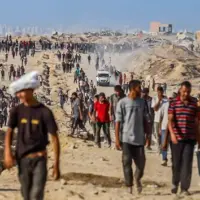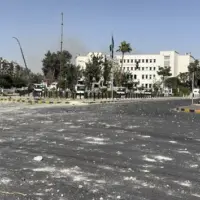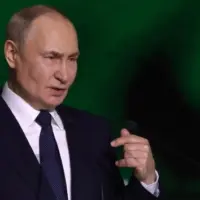(WASHINGTON) — After President Donald Trump threatened to impose “very severe” economic penalties against Vladimir Putin’s Russia if he doesn’t agree to a ceasefire in Ukraine within 50 days, the Trump administration has so far declined to provide many additional details about the consequences Russia will face or why he picked the deadline he chose.
“Well, at the end of 50 days, if we don’t have a deal, it’s going to be too bad,” Trump told reporters at the White House on Tuesday.
When asked why he decided to give the Russian leader nearly two months to comply with his demand, President Trump deflected.
“I don’t think 50 days is very long. It could be sooner than that,” Trump said.
“You should have asked that same question to Biden. Why did he get us into this war?” he continued. “You know why he got us in? Because he’s a dummy, that’s why.”
Despite pledging additional U.S. made weapons for Ukraine, Trump also said he didn’t support Ukraine’s President Zelenskyy ordering strikes on the Russian capital.
“He shouldn’t target Moscow,” he said. “No, we’re not looking to do that.”
On Monday, Trump said that Russia’s failure to reach a negotiated settlement with Ukraine within 50 days would lead to his administration imposing a 100% tariff rate on Russian imports as well as what he called “secondary tariffs” on countries that have continued to do business with Moscow.
“We’re very, very unhappy with him,” Trump said of Putin on Monday. “We’re going to be doing very severe tariffs if we don’t have a deal in 50 days.”
U.S. imports from Russia, which totaled around $3 billion in 2024 according to the Office of the U.S. Trade Representative, account for a small share of Moscow’s revenue, meaning Trump’s threat to hike tariffs on Russian goods likely wouldn’t pack much punch.
However, the president’s promise to raise tariffs on imports from third-party countries could carry more weight.
Some secondary sanctions aimed at weakening Russia’s war economy are already in place. The Biden administration steadily ramped up its use of the penalties throughout the conflict, primarily targeting foreign financial institutions accused of supporting Moscow’s military industrial complex and the so-called “shadow fleet” of tanker operators working to circumvent Western sanctions and price caps on Russian oil.
But going after countries that import oil and other resources from Russia would be a significant escalation.
Through much of the war, the Biden administration avoided taking direct aim at Russian energy exporters out of concern that doing so would cause global fuel prices to rise. Instead, the former administration worked with other members of the G7 to cap the price of Russian oil products, cutting into Moscow’s profits while allowing the exports to remain on the market.
Trump, on the other hand, has previously promised to go after Russia’s customers.
In March, Trump threatened to put “secondary tariffs on oil, on all oil coming out of Russia” during an interview with NBC News — adding “if you buy oil from Russia, you can’t do business in the United States.”
What countries would feel the impact?
The White House has yet to release specific details on Trump’s secondary tariffs, but his ambassador to NATO, Matthew Whitaker, said on Monday the top importers of Russian oil would be in the administration’s crosshairs.
“It’s about tariffs on countries like India and China that are buying their oil. And it really is going to I think dramatically impact the Russian economy,” he said during an interview with CNN.
But whether the secondary tariffs would stop at countries like China and India is an open question.
Despite the web of sanctions in place against Russia, the country still has many meaningful trade relationships, including ones with European allies.
Since Russia’s invasion of Ukraine, the EU has significantly dropped its share of Russian oil and gas imports and its plan to fully phase out those imports isn’t expected to fully come to fruition until the end of 2027 at the earliest.
Some Eastern European and Central Asian countries also have economies that rely on doing business with Russia, meaning they would almost certainly be unable to significantly scale back trade with Russia and would have the face the consequences of secondary tariffs.
The next 50 days
If the president sticks to his 50-day window, Russia can continue to carry out its summertime campaign against Ukraine until early September without facing additional consequences.
In his interview with CNN, Whitaker was also asked about how Trump made the decision on the timeline but didn’t give a clear answer.
“The time to end the slaughter is now. The time to end the killing is now. And so 50 days is the appropriate amount of time because it needs to happen now,” he responded.
Currently, Russia is making modest gains against Ukraine and may soon seek to leverage those advances to launch additional offenses in the eastern reach of the country, according to a recent assessment from the Institute of the Study of War.
Many officials and experts have long predicted that the Kremlin would push off serious talks on ending the war until the cooler months set in because it hopes to strengthen its position at the negotiating table by claiming as much territory as possible during the summer season.
In an interview with the BBC on Monday, Trump indicated he still wanted to pursue diplomacy with Russia, but that his patience with Putin was wearing thin.
“I’m not done with him, but I’m disappointed with him,” he said.
Kremlin spokesperson Dmitry Peskov responded to Trump’s threats on Monday, saying Moscow needed “time to analyze” the comments.
“The U.S. president’s statements are very serious,” Peskov said.
Copyright © 2025, ABC Audio. All rights reserved.













